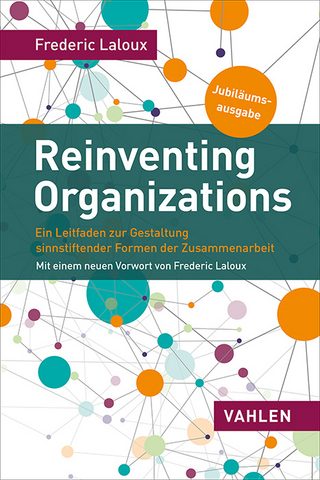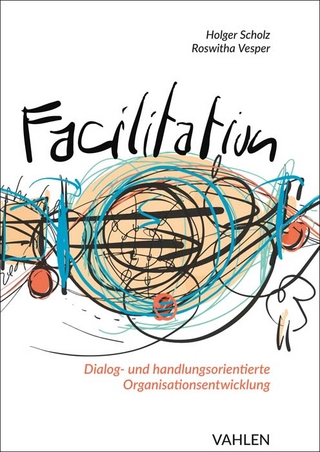
The Cambridge Handbook of Meeting Science
Cambridge University Press (Verlag)
978-1-107-06718-9 (ISBN)
This first volume to analyze the science of meetings offers a unique perspective on an integral part of contemporary work life. More than just a tool for improving individual and organizational effectiveness and well-being, meetings provide a window into the very essence of organizations and employees' experiences with the organization. The average employee attends at least three meetings per week and managers spend the majority of their time in meetings. Meetings can raise individuals, teams, and organizations to tremendous levels of achievement. However, they can also undermine effectiveness and well-being. The Cambridge Handbook of Meeting Science assembles leading authors in industrial and organizational psychology, management, marketing, organizational behavior, anthropology, sociology, and communication to explore the meeting itself, including pre-meeting activities and post-meeting activities. It provides a comprehensive overview of research in the field and will serve as an invaluable starting point for scholars who seek to understand and improve meetings.
Joseph A. Allen is an assistant professor of Industrial and Organizational Psychology at the University of Nebraska, Omaha. Nale Lehmann-Willenbrock is an assistant professor of Social and Organizational Psychology at VU University Amsterdam, the Netherlands. Steven G. Rogelberg is University Professor of Psychology and Management and the Director of the Organizational Science program at the University of North Carolina, Charlotte.
Part I. Introduction: 1. An introduction to The Cambridge Handbook of Meeting Science: why now?; 2. Exploring meeting science: key questions and answers; 3. Five theoretical lenses for conceptualizing the role of meetings in organizational life; Part II. Pre-Meeting Activities and Context: Meeting Setup: 4. Meeting preparation and design characteristics; 5. Meeting training: a suggestion; Meeting Composition: 6. How differences make a difference: the role of team diversity in meeting processes and outcomes; 7. Meetings across cultures: cultural differences in meeting expectations and processes; Pre-Meeting Communication: 8. So much more than 'chitchat': a closer look at pre-meeting talk; Macro Meeting Context: 9. Meetings all over the world: structural and psychological characteristics of meetings in different countries; 10. Organizational meeting orientation: the construct, scales and research propositions; 11. A systemic view of meetings – windows on organization collective minding; Part III. The Meeting Itself: Capturing and Understanding Dynamics and Processes of the Meeting: 12. Meetings as interactional achievements: a conversation analytic perspective; 13. Multimodal perspectives on meeting interaction: recent trends in conversation analysis; 14. Toward a theory of strategic meeting interaction; 15. Social dynamics at work: meetings as a gateway; 16. Social networks in meetings: how do people connect?; 17. Effective leader behaviors in regularly held staff meetings: surveyed vs videotaped and coded observations; 18. They meet, they talk … but nothing changes: meetings as a focal context for studying change processes in organizations; 19. Relative status and emotion regulation in workplace meetings: a conceptual model; 20. Dynamic affect in team meetings: an interpersonal construct embedded in dynamic interaction processes; Tools and Models for Promoting Meeting Success: 21. Designing and executing effective meetings with codified best facilitation practices; 22. Finding the gorilla: the impact of complexity and diversity on meeting process; 23. Information utilization in meetings; 24. What is consensus and how is it achieved in meetings? Four types of consensus decision-making; 25. Creativity and meetings: do team meetings facilitate or hinder creative team performance?; Part IV. Special Types of Meetings: Post Event Meetings: 26. Debrief: the learning meeting; 27. Implementing after action review systems in organizations: key principles and practical considerations; Virtual Meetings: 28. Meeting organization strategy: the 'why' and 'how' of meetings with virtual presence; 29. The successful facilitation of virtual team meetings; Part V. Synthesis and Conclusion: 30. The science and practice of workplace meetings; 31. There's something about meetings: order and disorder in the study of meetings.
| Erscheint lt. Verlag | 15.7.2015 |
|---|---|
| Reihe/Serie | Cambridge Handbooks in Psychology |
| Zusatzinfo | 50 Tables, unspecified; 3 Halftones, unspecified; 3 Halftones, black and white; 40 Line drawings, black and white |
| Verlagsort | Cambridge |
| Sprache | englisch |
| Maße | 183 x 257 mm |
| Gewicht | 1540 g |
| Themenwelt | Wirtschaft ► Betriebswirtschaft / Management ► Planung / Organisation |
| ISBN-10 | 1-107-06718-9 / 1107067189 |
| ISBN-13 | 978-1-107-06718-9 / 9781107067189 |
| Zustand | Neuware |
| Haben Sie eine Frage zum Produkt? |
aus dem Bereich


